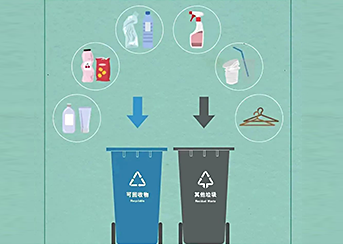New Spanish regulations multi-pronged approach to promote plastic packaging recycling
On March 31, 2022, the Spanish Parliament passed the Waste and Contaminated Soil Promoting Circular Economy Law, banning the use of phthalates and bisphenol A in food packaging and supporting the reusability of food packaging in 2022 It will officially come into effect on April 9.
The law aims to minimize the generation of waste, especially single-use plastics, and manage the negative impact of packaging waste on human health and the environment, and promote the development of a circular economy. This law replaces Law No. 22/2011 on the Control of Waste and Contaminated Soil of 28 July 2011 and incorporates Directive (EU) 2018/851 on waste and Directive (EU) 2019/904 on the reduction of certain Directives on the environmental impact of some plastic products were incorporated into the Spanish legal system.
Restrict the types of plastic products on the market
In order to reduce the impact of plastic products on the environment, the "Waste and Contaminated Soil Promotion of Circular Economy Law" adds new types of plastics that are prohibited from being placed on the Spanish market:
1.Plastic products mentioned in section IVB of the Annex to the Regulation;
2.Any plastic product made using oxidatively degradable plastics;
3.Plastic products with intentionally added microplastics less than 5 mm.
Regarding the restrictions set out in part, the provisions of Annex XVII to Regulation (EC) No 1907/2006 of the European Parliament and of the Council (REACH Regulation) will apply.
Annex IVB points out that disposable plastic products such as cotton swabs, cutlery, plates, straws, beverage bottles, sticks used to fix and connect balloons, beverage containers made of expanded polystyrene, etc. are restricted from being put on the market, such as for medical purposes, etc. Except as otherwise provided.
Promote plastic recycling and application
The Waste and Contaminated Soil Promoting Circular Economy Law amends the recycled plastic targets in Law No. 22/2011: by 2025, all polyethylene terephthalate (PET) bottles must contain at least 25% recycled plastic, By 2030, PET bottles must contain at least 30% recycled plastic. This regulation is expected to promote the development of the secondary market for recycled PET in Spain.
In addition, in order to promote the recycling of plastic products, the recycled plastic part contained in products subject to taxation is not taxed. The import procedure for products within the scope of the tax target must record the quantity of imported non-recycled plastics. This regulation will take effect from January 1, 2023.


Starting from January 1, 2023, in accordance with the principles of circular economy, Spain will begin to impose a plastic tax on single-use, non-reusable plastic packaging.
Taxable objects:
Including manufacturers in Spain, companies and self-employed individuals who import to Spain and engage in procurement within the EU.
Tax scope:
Contains a broad concept of "non-recyclable plastic packaging", including:
1. Used to produce non-reusable plastic packaging semi-finished products;
2. Used to enclose, trade or display non-reusable plastic products;
3. Non-reusable plastic containers.
Some examples of products within the scope of taxation include but are not limited to: plastic bags, plastic bottles, plastic packaging boxes, plastic packaging films, plastic packaging tapes, plastic cups, plastic tableware, plastic straws, plastic packaging bags, etc.
Whether these products are used for packaging food, beverages, daily necessities or other items, as long as the outer packaging of the package is made of plastic, plastic packaging tax will be levied.
If it is recyclable plastic, a recyclability certificate is required.
tax rate:
The tax rate is EUR 0.45 per kilogram based on the net weight declaration in Article 47.
The concepts of environmental protection and sustainable development are receiving attention in many countries around the world. As a result, there is growing emphasis on the need to replace single-use plastic packaging with recyclable or degradable alternatives. This shift has been driven by recognition of the harmful impact plastic waste has on the environment, particularly in terms of pollution and depletion of natural resources.


In response to this pressing issue, many countries are prioritizing the search for reliable suppliers to facilitate the conversion of plastic packaging into recyclable or biodegradable alternatives. The goal is to completely replace plastic packaging with environmentally friendly materials, thus reducing the environmental burden caused by non-recyclable plastics.
The shift from plastic packaging to recyclable or biodegradable packaging is an important step towards achieving sustainability and minimizing the ecological footprint of various industries. By embracing this shift, businesses and consumers alike can contribute to protecting the environment and natural resources.
Recyclable and biodegradable packaging materials offer a promising solution to the challenges posed by traditional plastic packaging. Not only do these alternatives reduce reliance on non-renewable resources, they also help reduce the accumulation of plastic waste in landfills and oceans. Additionally, the use of recyclable and biodegradable packaging supports the circular economy by promoting the reuse and recycling of materials, thus minimizing overall environmental impact.
As the demand for eco-friendly packaging continues to grow, the industry is witnessing a surge in innovation and technological advancements aimed at developing sustainable packaging solutions. This includes exploring new materials and manufacturing processes that adhere to principles of environmental stewardship and resource efficiency.
In summary, the imminent replacement of plastic packaging with recyclable or biodegradable alternatives reflects a critical shift towards environmental sustainability. By prioritizing environmentally friendly packaging, countries and companies are taking proactive steps to address the environmental challenges associated with plastic waste. This shift not only underlines a commitment to environmental protection but also signals a collective effort to build a more sustainable and resilient future for future generations.


We are a manufacturer specializing in producing the coffee packaging bags for over 20 years. We have become one of the largest coffee bag manufacturers in China.
We use the best quality WIPF valves from Swiss to keep your coffee fresh.
We have developed the eco-friendly bags, such as the compostable bags、recyclable bags and PCR material packaging. They are the best options of replacing the conventional plastic bags.
Attached our catalogue, please send us the bag type, material, size and quantity you need. So we can quote you.
Post time: Apr-12-2024







